In this edition
- Turning up the heat | Biochemistry & Molecular Biology Professor Jeffrey Harper investigates pollen to help crops survive Nevada's heat
- Graduate of the Pack | Ana Nunez Zepeda '19, nutrition instructor
- Charles Schembre brings vineyard experience to Desert Farming Initiative
- 4-H youth learn life skills through judging animals
- Making small businesses our business | Economic & Business Development Program partnerships help grow Nevada small businesses
About our College
A founding college of the University, we have a long tradition of excellence in teaching, research and engagement programs that benefit the health and economic vitality of Nevada. We offer programs in:
- agriculture, horticulture, rangeland & veterinary sciences
- biochemistry & molecular biology
- children, youth & families
- community & economic development
- health & nutrition
- natural resources & environmental science
Turning up the heat
Biochemistry & Molecular Biology Professor Jeffrey Harper investigates pollen to help crops survive Nevada's heat
By Tiffany Kozsan
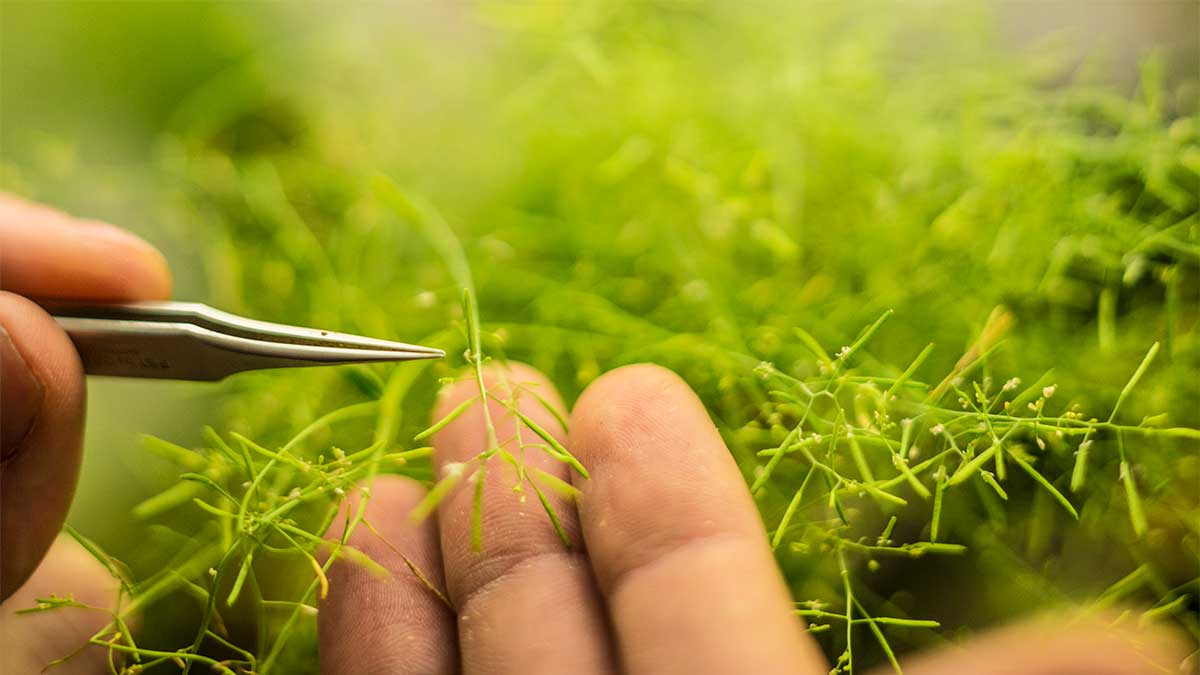 With genetically altered pollen, commercial crops such as Camelina may have a longer growing season. Photo by Jeff Dow.
With genetically altered pollen, commercial crops such as Camelina may have a longer growing season. Photo by Jeff Dow.

Jeffrey Harper.
When exposed to warmer temperatures, pollen cells in plants break down and malfunction, causing the pollen to burst before it can be used for reproduction. This means pollination must occur before temperatures become too hot to produce crops, and with temperatures rising, that viable window is shrinking. Biochemistry & Molecular Biology Professor Jeffrey Harper, with funding through the Nevada Agricultural Experiment Station, is researching ways to alter genes to make pollen more heat-resistant. Harper is conducting trials on a model plant, Arabidopsis, a type of mustard that has a small genome that is easy to manipulate at the genetic level. Harper is learning which genes do what within the plant by using a gene-editing liquid called a CRISPR-Cas9, which makes an organism’s genes work more or less than normal and can remove or replace genes to get different results. His goal is to take what he learns from his research on the model plant and apply it to commercial crops such as Camelina (being studied for biofuel and as oil for human consumption), wheat, corn and rice.
Jeffrey's research could save agriculture
“By modifying the cells in a plant, we can make it do what we want and when we want to increase its heat tolerance."
By Ashley Andrews
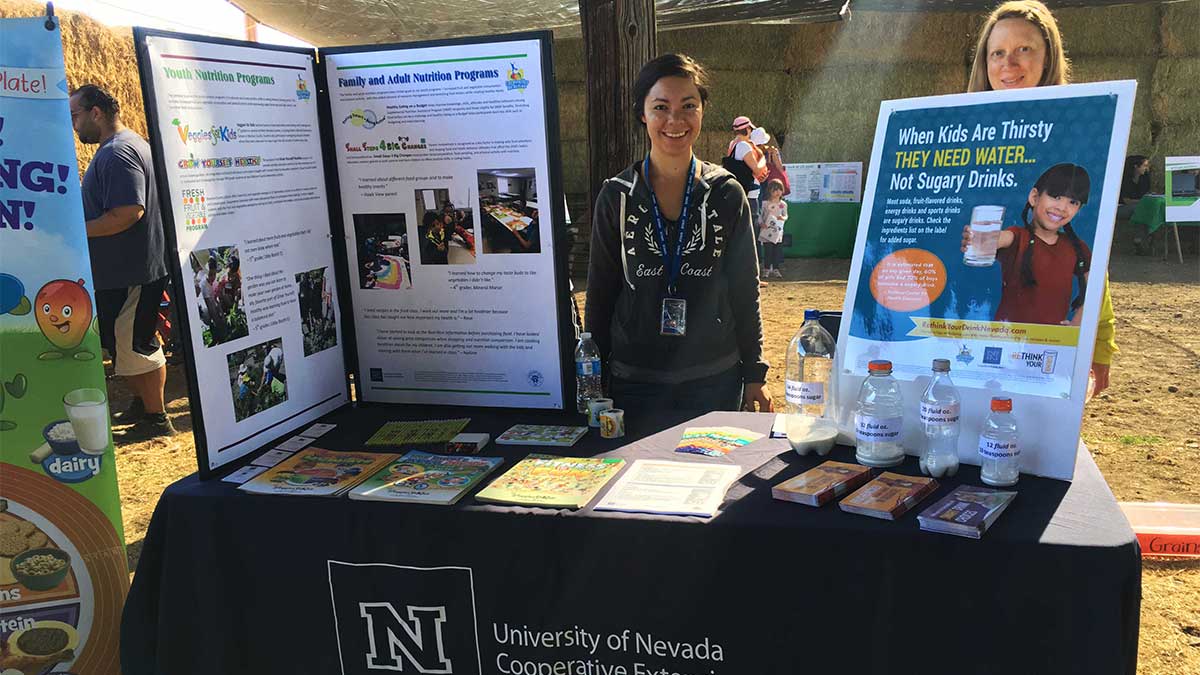 Ana Nunez Zepeda (center) runs an educational booth at Nevada Field Day, an annual College of Agriculture, Biotechnology & Natural Resources' community event. Photo by Ashley Andrews.
Ana Nunez Zepeda (center) runs an educational booth at Nevada Field Day, an annual College of Agriculture, Biotechnology & Natural Resources' community event. Photo by Ashley Andrews.
"What motives me to do what I do is contributing a little something to better the health of low-income families," Ana Nunez Zepeda said of her job as a community-based nutrition instructor with University of Nevada Cooperative Extension.
She began the job about four years ago.
As a Truckee Meadows Community College student, Ana was placed for a community internship with Cooperative Extension's nutrition department. After completing her internship, she continued with Cooperative Extension as an instructor.
Ana teaches nutrition programs to low-income families. A typical day at work has her preparing a lesson, grocery shopping for lesson supplies and then teaching a nutrition topic to families at five Reno Housing Authority sites.
"Teaching nutrition lessons to low-income families has a great social impact," Ana said. "It’s important that there are people doing what I do because we can help our community by teaching them how to have a healthy lifestyle."
Ana's story is life-changing
"I chose to go to college because I knew education is the key for bigger opportunities," she said. "And coming from a big family with no academic background, I knew I had to be the one starting a new future for my family."
By Hannah Alfaro
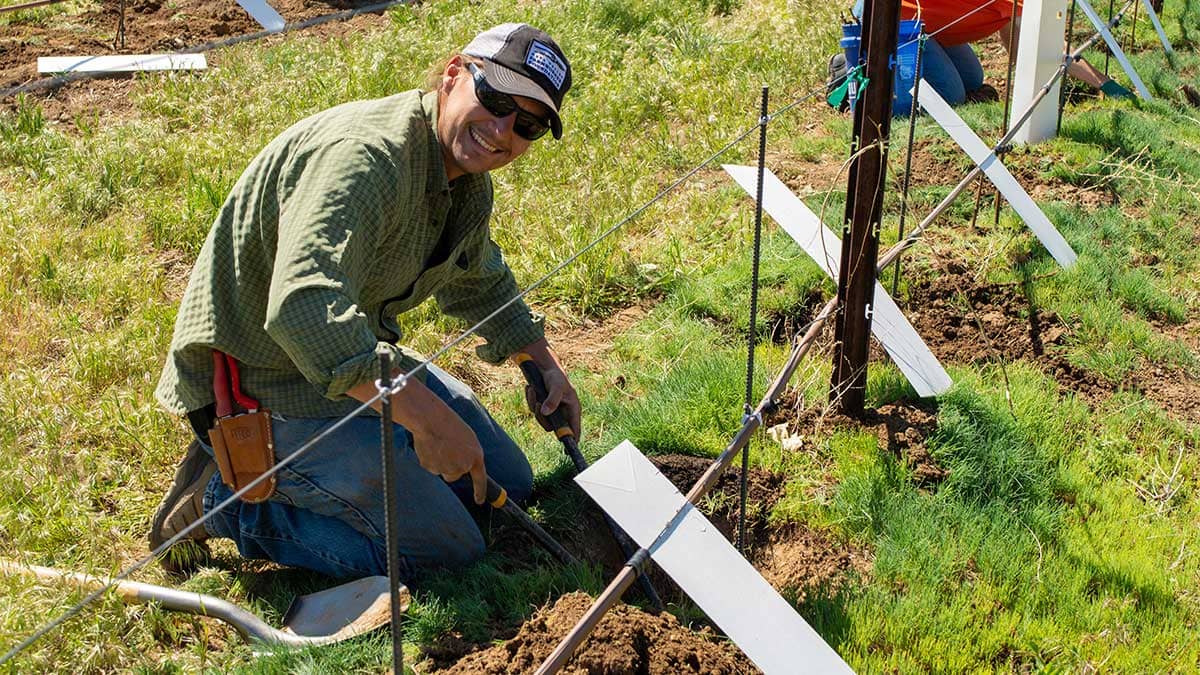 Charles Schembre plants a new 1-acre demonstration vineyard to continue studying wine grapes. Photo by Robert Moore.
Charles Schembre plants a new 1-acre demonstration vineyard to continue studying wine grapes. Photo by Robert Moore.
The Desert Farming Initiative welcomes a new project manager, Charles Schembre, to the Nevada Agriculture Experiment Station. The Initiative is a diversified commercial farm at the University that serves as a demonstration, education, outreach and research farming program. It is a collaborative project of the University’s College of Agriculture, Biotechnology & Natural Resources and its Experiment Station and Cooperative Extension units.
Schembre joined the University in fall 2018, and in December, he attended a course so he and the Initiative’s staff could teach food safety best practices and began developing a technical assistance program to teach Nevada growers how to comply with the Food Safety Modernization Act. This past spring, Schembre oversaw the planting of a new, 1-acre demonstration vineyard of cabernet franc, merlot and malbec wine grapes at the University, expanding upon more than 20 years of wine grape research done at the Experiment Station focusing on techniques for advancing viticulture in the high desert. Schembre previously worked for the Napa County Resource Conservation District managing a demonstration vineyard and orchard, as well as multiple conservation programs focused on soil health, water conservation and biodiversity. He also served two terms in the AmeriCorps Watershed Stewards Project.
In addition to researching grapes at the new vineyard, Schembre says the Initiative is conducting trials on vegetables and fruits, such as winter lettuce and raspberries, to collect crop data on different growing conditions.
“We collect data on 30 different varieties of vegetables we grow and also provide services, like organic plant propagation, to the local agriculture industry,” he said.
Schembre hopes to expand the farming operation to become a mid-sized farm that focuses on precision farming techniques. He also wants to create more teaching and learning opportunities for students at the Experiment Station, as well as expand the Initiative’s services to the community.
“I hope that with the expansion of the farming operation we can donate even more to the food pantry,” explained Schembre. “I also look forward to continuing to provide the latest research-based food safety information to our state’s producers, which is one of the Initiative’s primary focuses.”
Charles helps agriculture thrive
Learn more about upcoming Desert Farming Initiative workshops, opportunities to get involved and more.
By Carrie Stark
The Nevada State 4-H Livestock Contests were held June 29 in Lyon County. Participants from Lyon, Churchill, Elko and Clark Counties competed in livestock judging and a skill-a-thon. These contests tested the students’ knowledge in conformation, quality assurance, production practices and the animal industry. Participating youth had to qualify in local contests to be eligible to participate in the state competition. The Senior Division state winners in both livestock judging and skill-a-thon will represent Nevada in the national contests in Denver and Louisville.
The process of judging animals has a positive impact on the development of workforce skills. It has been shown that youth who participate in judging activities and have an interest in the livestock industry gain necessary skills for their futures and their careers. One element of the contests is that youth must describe their ranking of the animals and defend their thought processes and decisions. This process helps participants become more proficient in reasoning and public speaking skills. It has been found that youth who participate in livestock judging/skill-a-thon contests are able to expand their critical thinking, decision-making and communication skills (Nash and Sant, 2005).
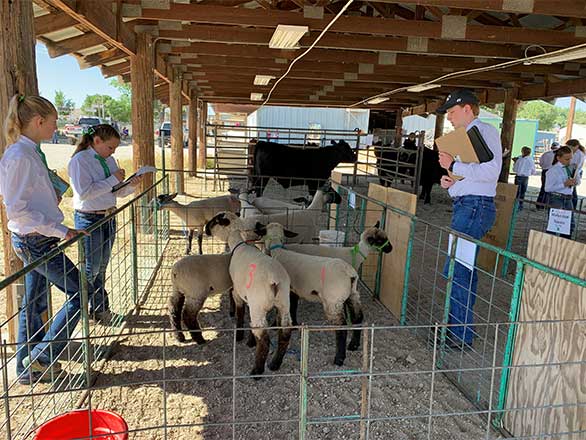
Karlie S. and Kaitlin G., both from Churchill County, and Wade S. of Elko County judge a class of sheep as part of the Livestock Judging Contest. Photo by Lacey Sproul-Tom.
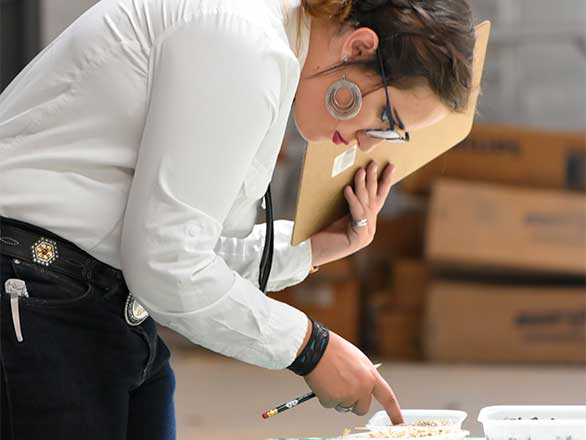
Sami A., with Elko County, identifies feed samples in the State Livestock Skill-a-Thon. Photo by Carrie Stark.
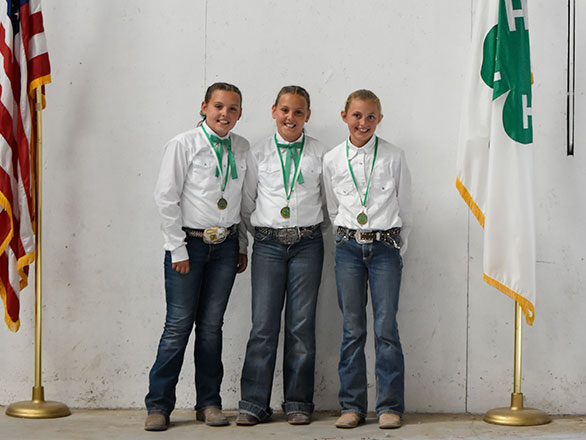
Karlie S., Kortnie S. and Lauren G., from Churchill County, took first place in Junior Livestock Judging. Photo by Molly Pezzuto.
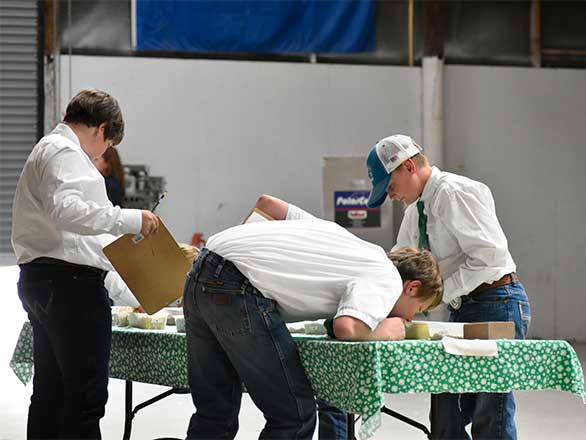
Riley A. of Elko County, Colt S. of Lyon County and William B. of Elko County identify feed samples as part of the State Livestock Skill-a-Thon. Photo by Carrie Stark.
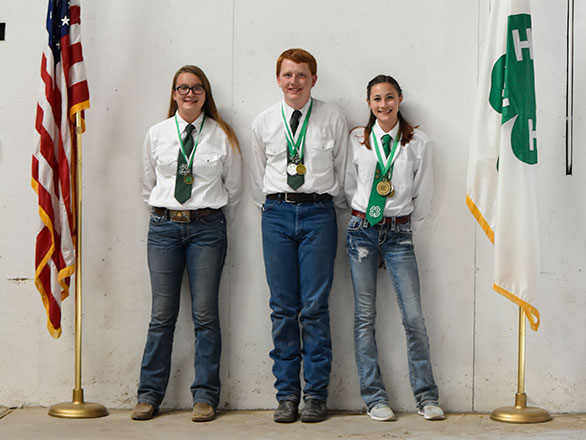
Randi P., Kieley M. and Wade S., from Elko County, took first place in Senior Livestock Judging. Photo by Molly Pezzuto.
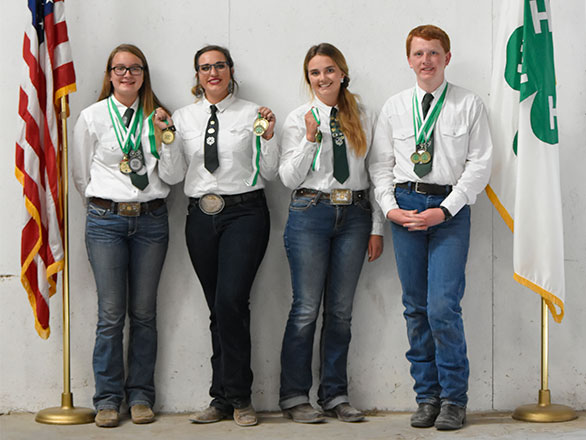
Allie P., William B., Mesa J. and Riley A., from Elko County, took first place in the Senior Livestock Skill-a-Thon. Photo by Molly Pezzuto.
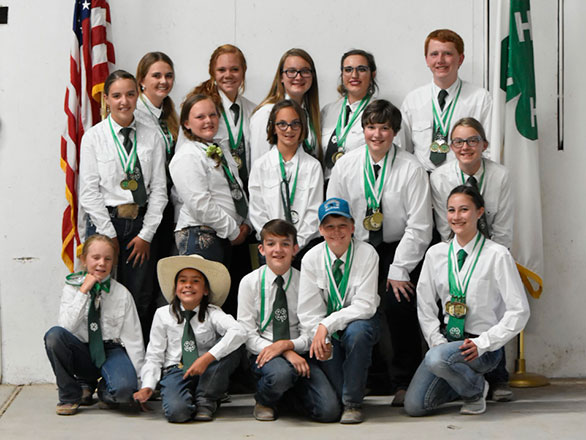
Elko County participants included (kneeling row, left to right) Jade B, Mamie R., Caden P., William B. and Kiely M., (middle row, left to right) Mesa J., Ruby B., Millie B., Riley A., Allie P., (back row, left to right) Leanna S., Ella B., Randi P., Sami A. and Wade S. Photo by Molly Pezzuto.
Livestock Judging Winners:
- First Place Junior Team: Churchill County (Karlie S., Kortnie S., Lauren G.)
- Overall Individual Junior Division: Jade B. (Elko County) and Kortnie S. (Churchill County) Tie
- First Place Intermediate Team: Elko County (Allie P., Riley A., Mesa J., William B.)
- Overall Individual Intermediate Division: Riley A. (Elko County)
- First Place Senior Team: Elko County (Randi P., Kieley M., Wade S.)
- Overall Individual Senior Division: Kieley M. (Elko County)
Livestock Skill-a-Thon Winners:
- First Place Junior Team: Churchill County (Karlie S., Kortnie S., Lauren G.)
- Overall Individual Junior Division: Lauren G. (Churchill County)
- First Place Intermediate Team: Elko County (Allie P., William B., Mesa J., Riley A.)
- Overall Individual Intermediate Division: Mesa J. (Elko County)
- First Place Senior Team: Elko County (Sami A., Randi P., Leanna S., Wade S.)
- Overall Individual Senior Division: Sami A. (Elko County)
4-H youth learn leadership, citizenship and life skills at school, in local clubs and at camp
"4-H Camp is a gem that we treasure," said Cooperative Extension Director Ivory Lyles, "and that we know we must continue to maintain and update to benefit generations to come."
By Tiffany Kozsan
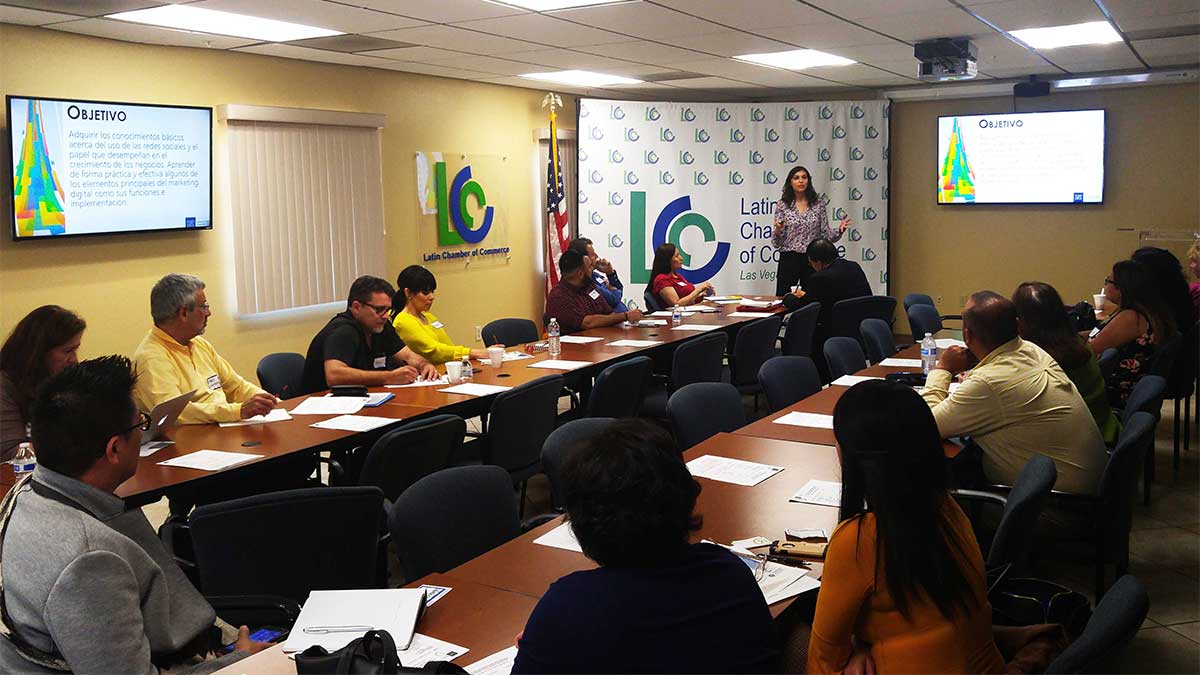 Business Development Instructor Reyna Mendez, with Cooperative Extension, teaches Spanish speakers about digital marketing at the Las Vegas Latin Chamber of Commerce. Photo by Juan Salas.
Business Development Instructor Reyna Mendez, with Cooperative Extension, teaches Spanish speakers about digital marketing at the Las Vegas Latin Chamber of Commerce. Photo by Juan Salas.
This March, Cooperative Extension’s Economic & Business Development Team launched a new program to provide educational resources and tools for small businesses.
According to the U.S. Department of the Treasury, businesses with fewer than 500 employees are considered “small businesses.” In Nevada, 95 percent of businesses are small businesses, and the remaining 5 percent often collaborate with small businesses.
The program, operating in Cark County and run in partnership with state agencies and chambers of commerce in Las Vegas, aims to educate small-business owners by providing workshops on timely and relevant business topics to assist with managing and growing their businesses. The team has already provided 12 workshops, some in Spanish and some in English, on tax basics, digital marketing, entity taxes and Facebook. In addition, program instructors develop workshops and seminars based on feedback from the state agencies and chambers and from surveys of workshop attendees.
Partners of The Economic & Business Development Program include the Las Vegas Urban Chamber of Commerce, Las Vegas Latin Chamber of Commerce, Las Vegas Asian Chamber of Commerce, Nevada Department of Business and Industry, and Nevada Contractors Association.
Get the tools to grow your business
Learn about upcoming workshops and seminars.
Growing a stronger Nevada
Our programs work together to make an impact
Our teaching, research and engagement programs are intertwined and complement one another. Faculty who teach on campus also conduct research as part of the Experiment Station, allowing students to learn about and participate in research. Extension faculty engaging with communities identify research needs, as well as join Experiment Station faculty to conduct research. Faculty on campus help to develop Extension programs in communities.
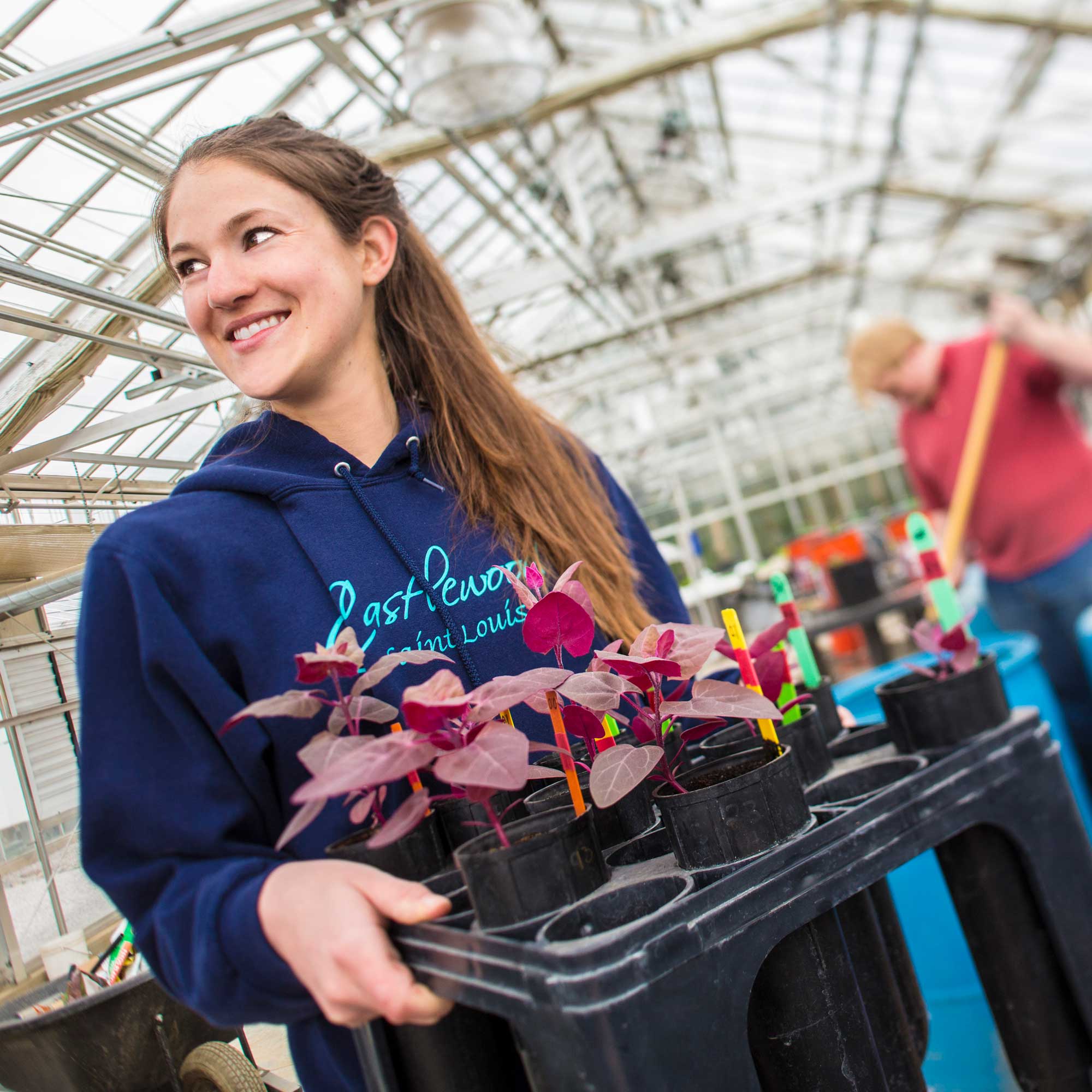
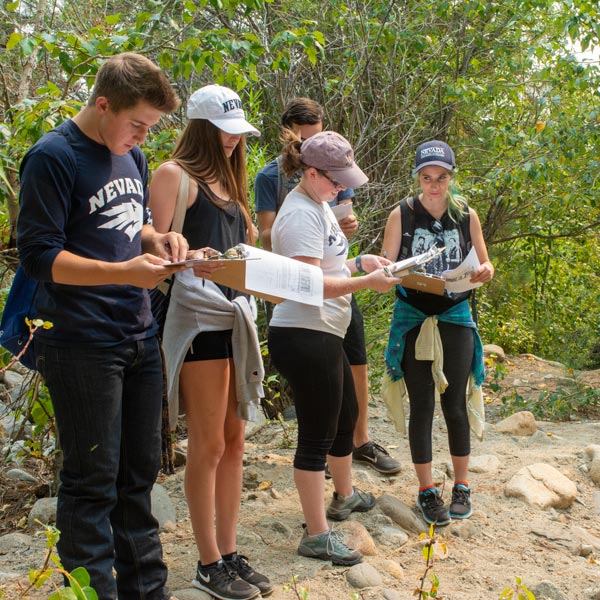
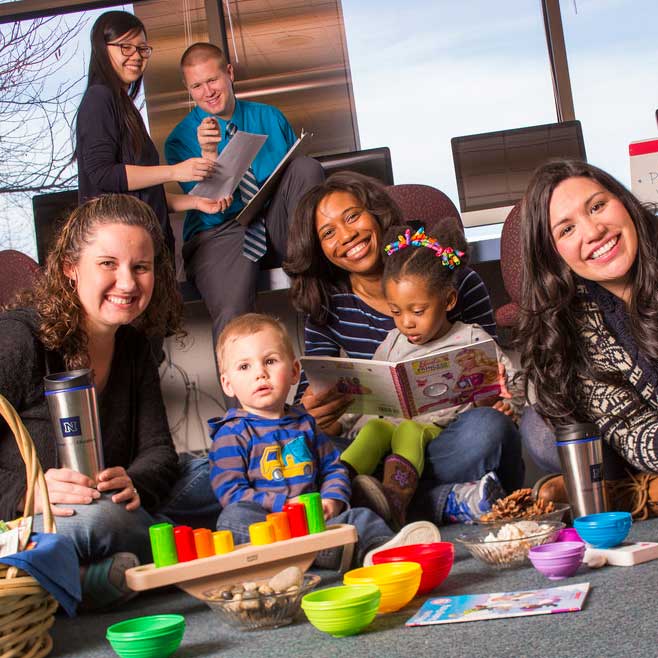
Want to help grow Nevada?
Consider making a contribution in support of classroom, lab or office space; graduate assistantships; student scholarships; or upgrades to Nevada 4-H Camp. To learn more, please contact Mitch Klaich '02, director of development, at 775-682-6490.